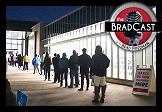 In a blog item on Monday, law professor Ilya Somin, of the Washington Post's right-leaning "Volokh Conspiracy" blog, declared the weekend's reported 96.7% vote in favor of Crimea joining Russia to be either fraudulent or the result of voter intimidation of some kind.
In a blog item on Monday, law professor Ilya Somin, of the Washington Post's right-leaning "Volokh Conspiracy" blog, declared the weekend's reported 96.7% vote in favor of Crimea joining Russia to be either fraudulent or the result of voter intimidation of some kind.
In the article, Somin called the results "dubious" and "highly improbable," declaring at least three times in his very short, 6-paragraph item that the referendum's results were "achieved" (his quotes) and/or "likely tainted by fraud or intimidation" --- the likelihood of which Somin describes as a "fact."
"It is highly improbable that 96.7% would have voted yes in a genuinely free vote, since the Crimean population includes large Ukrainian and Crimean Tatar minorities that are overwhelmingly opposed to a return to Russian rule," the George Mason University School of Law professor instructs. "Crimean officials are also reporting a high 83% turnout. If that figure is correct, it makes it unlikely that the 96.7% result is explicable by selective turnout. If, on the other hand, officials are lying about the turnout, they could be engaging deception about the vote margin as well."
Mainstream corporate media in the U.S. have a very difficult time reporting on real evidence of fraud in American elections, much less reporting it as "fact." But when it comes to elections overseas, particularly those which involve perceived geopolitical foes of the U.S., papers like the Washington Post seem to have little, if any, reluctance in offering exceedingly speculative arguments that all but declare elections held by others to be "fraudulent." (See this head-spinning irony, also involving Ukraine, just days after the very same disparity in Exit Polling, carried out by the same firm, resulted in questions about the legitimacy of results from Ukraine's November 2004 Presidential election, but not the still-disputed results of the 2004 Presidential elections in the U.S. just a week or two earlier.)
But 96.7% is, indeed, an outrageously high number for any election result. So how much legitimacy should be given to the results of the voting announced from the weekend referendum in Crimea, given what we know about the balloting and what we don't? And can the U.S. learn anything --- for better or worse --- about the way votes were cast and counted in Crimea?...


 Sunday 'Your Choice' Toons
Sunday 'Your Choice' Toons The GOP 'Voter Fraud'
The GOP 'Voter Fraud' 'Green News Report' 10/31/24
'Green News Report' 10/31/24
 'Closing Arguments'with Digby and Driftglass: 'BradCast' 10/30/24
'Closing Arguments'with Digby and Driftglass: 'BradCast' 10/30/24 Trump Promises to be a Lawless, Authoritarian President. Believe Him: 'BradCast' 10/29/24
Trump Promises to be a Lawless, Authoritarian President. Believe Him: 'BradCast' 10/29/24 'Green News Report' 10/29/24
'Green News Report' 10/29/24 Ballots Burn, Billionaires 'Obey in Advance', Callers Ring In: 'BradCast' 10/28/24
Ballots Burn, Billionaires 'Obey in Advance', Callers Ring In: 'BradCast' 10/28/24 Musk's Privatized Internet Satellite System Threatens U.S. National Security
Musk's Privatized Internet Satellite System Threatens U.S. National Security Sunday 'VOTE NOW!' Toons
Sunday 'VOTE NOW!' Toons 'Green News Report' 10/24/24
'Green News Report' 10/24/24 Harris on Hope, Trump's Fasc-ism in Bumpy Closing Days: 'BradCast' 10/24/24
Harris on Hope, Trump's Fasc-ism in Bumpy Closing Days: 'BradCast' 10/24/24 Kelly: Trump 'Fascist', Admires Hitler, Disrespects Law: 'BradCast' 10/23/24
Kelly: Trump 'Fascist', Admires Hitler, Disrespects Law: 'BradCast' 10/23/24 Accountability Comes For Rudy, Other Election Deniers: 'BradCast' 10/22/24
Accountability Comes For Rudy, Other Election Deniers: 'BradCast' 10/22/24 Elon Musk's 'Vote Buying' and Lying for Trump: 'BradCast' 10/21/24
Elon Musk's 'Vote Buying' and Lying for Trump: 'BradCast' 10/21/24 Fake v. Real Censorship and Trump/Fox Fetish-ized Grievance World: 'BradCast' 10/17/24
Fake v. Real Censorship and Trump/Fox Fetish-ized Grievance World: 'BradCast' 10/17/24 'Americans Aren't Prepared for Trump's Police State': 'BradCast' 10/16/24
'Americans Aren't Prepared for Trump's Police State': 'BradCast' 10/16/24 Good News for Georgia Voters, the Economy and Kamala Harris: 'BradCast' 10/15/24
Good News for Georgia Voters, the Economy and Kamala Harris: 'BradCast' 10/15/24 Fascism Comes to America: 'BradCast' 10/14/24
Fascism Comes to America: 'BradCast' 10/14/24
 VA GOP VOTER REG FRAUDSTER OFF HOOK
VA GOP VOTER REG FRAUDSTER OFF HOOK Criminal GOP Voter Registration Fraud Probe Expanding in VA
Criminal GOP Voter Registration Fraud Probe Expanding in VA DOJ PROBE SOUGHT AFTER VA ARREST
DOJ PROBE SOUGHT AFTER VA ARREST Arrest in VA: GOP Voter Reg Scandal Widens
Arrest in VA: GOP Voter Reg Scandal Widens ALL TOGETHER: ROVE, SPROUL, KOCHS, RNC
ALL TOGETHER: ROVE, SPROUL, KOCHS, RNC LATimes: RNC's 'Fired' Sproul Working for Repubs in 'as Many as 30 States'
LATimes: RNC's 'Fired' Sproul Working for Repubs in 'as Many as 30 States' 'Fired' Sproul Group 'Cloned', Still Working for Republicans in At Least 10 States
'Fired' Sproul Group 'Cloned', Still Working for Republicans in At Least 10 States FINALLY: FOX ON GOP REG FRAUD SCANDAL
FINALLY: FOX ON GOP REG FRAUD SCANDAL COLORADO FOLLOWS FLORIDA WITH GOP CRIMINAL INVESTIGATION
COLORADO FOLLOWS FLORIDA WITH GOP CRIMINAL INVESTIGATION CRIMINAL PROBE LAUNCHED INTO GOP VOTER REGISTRATION FRAUD SCANDAL IN FL
CRIMINAL PROBE LAUNCHED INTO GOP VOTER REGISTRATION FRAUD SCANDAL IN FL Brad Breaks PA Photo ID & GOP Registration Fraud Scandal News on Hartmann TV
Brad Breaks PA Photo ID & GOP Registration Fraud Scandal News on Hartmann TV  CAUGHT ON TAPE: COORDINATED NATIONWIDE GOP VOTER REG SCAM
CAUGHT ON TAPE: COORDINATED NATIONWIDE GOP VOTER REG SCAM CRIMINAL ELECTION FRAUD COMPLAINT FILED AGAINST GOP 'FRAUD' FIRM
CRIMINAL ELECTION FRAUD COMPLAINT FILED AGAINST GOP 'FRAUD' FIRM RICK SCOTT GETS ROLLED IN GOP REGISTRATION FRAUD SCANDAL
RICK SCOTT GETS ROLLED IN GOP REGISTRATION FRAUD SCANDAL VIDEO: Brad Breaks GOP Reg Fraud Scandal on Hartmann TV
VIDEO: Brad Breaks GOP Reg Fraud Scandal on Hartmann TV RNC FIRES NATIONAL VOTER REGISTRATION FIRM FOR FRAUD
RNC FIRES NATIONAL VOTER REGISTRATION FIRM FOR FRAUD EXCLUSIVE: Intvw w/ FL Official Who First Discovered GOP Reg Fraud
EXCLUSIVE: Intvw w/ FL Official Who First Discovered GOP Reg Fraud GOP REGISTRATION FRAUD FOUND IN FL
GOP REGISTRATION FRAUD FOUND IN FL




















 During
During  Meanwhile...Back up in Wisconsin, where
Meanwhile...Back up in Wisconsin, where 







 If you didn't happen to see what happened Tuesday on the U.S. Senate floor [
If you didn't happen to see what happened Tuesday on the U.S. Senate floor [
 Whatever your feelings about the Affordable Care Act (ACA or 'ObamaCare'), one of its main objectives was to lower the number of Americans without health insurance. According to
Whatever your feelings about the Affordable Care Act (ACA or 'ObamaCare'), one of its main objectives was to lower the number of Americans without health insurance. According to  Some encouraging news to begin your week, along with apologies to Ian Millhiser for running
Some encouraging news to begin your week, along with apologies to Ian Millhiser for running 

 On Tuesday, the L.A. City Council voted to join cities like New York and Chicago by
On Tuesday, the L.A. City Council voted to join cities like New York and Chicago by  Big news on the Big 'Clean Coal' front today, just breaking
Big news on the Big 'Clean Coal' front today, just breaking 













